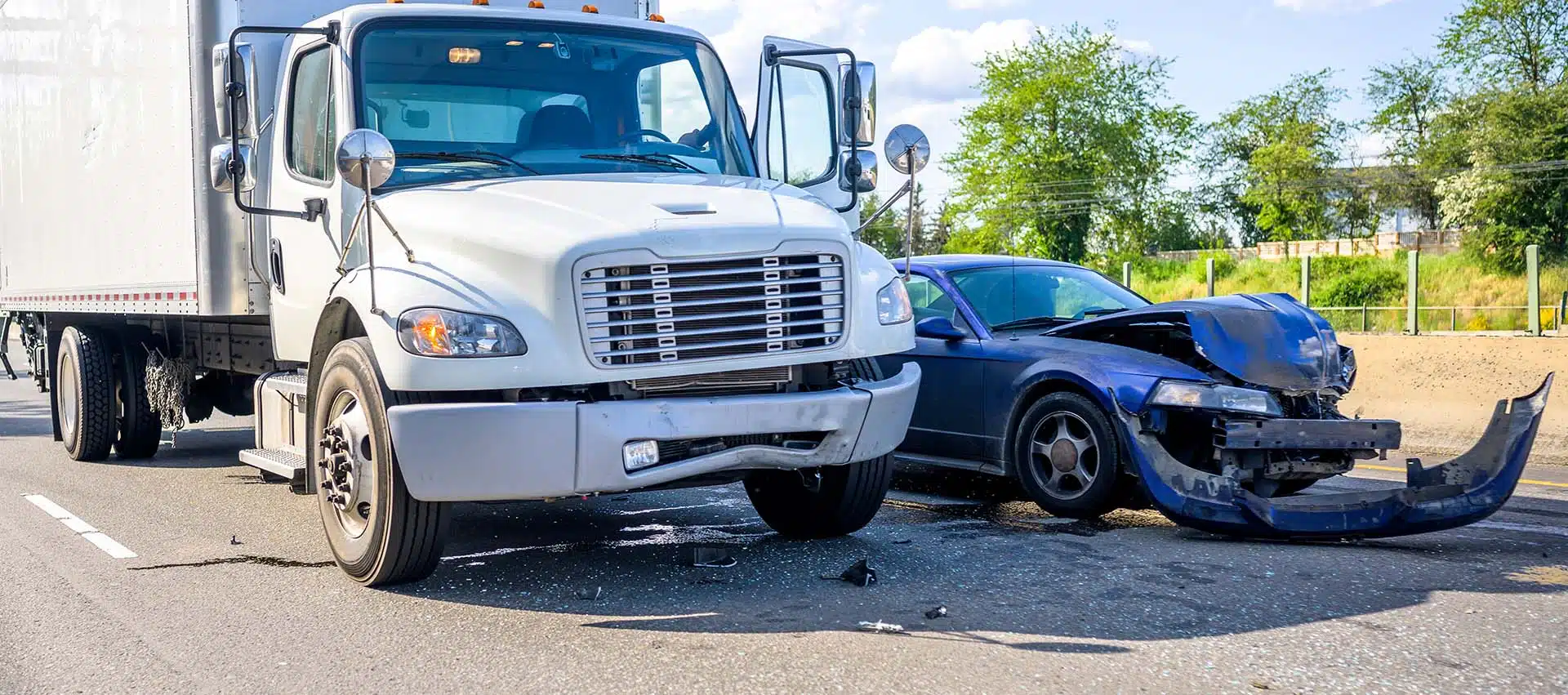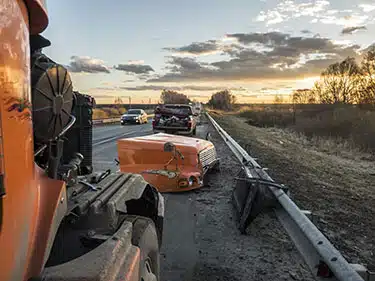
Vermont Truck Accident Lawyer






Focused representation for serious truck accidents in Vermont.
Why Seek Help from a Vermont Truck Accident Attorney?
A collision with a commercial truck can change your life in seconds. Tractor-trailers, tankers, and other large trucks are governed by strict federal and state safety rules. When those rules are ignored, the injuries are often severe.
If you were injured in a truck accident in Vermont, early decisions matter. These cases are not like ordinary car accidents. They involve larger vehicles, higher insurance limits, and multiple parties who may share responsibility. Critical evidence can disappear quickly, and trucking companies often act immediately to protect their interests.
Working with a Vermont truck accident lawyer helps balance that dynamic. Early legal guidance can protect your rights and help ensure your claim reflects the full impact of your injuries.Sabbeth Law represents individuals and families across Vermont who have been seriously injured in truck accidents. Our role is to investigate what happened, identify who is responsible, and pursue compensation that accounts for both current losses and long-term consequences.
Sabbeth Law is committed to helping victims of serious truck accidents recover what they are owed. Let’s talk today.
Jump to the truck accident information you need:
- View Our Reviews
- Browse Our Truck Accident Guide
- Browse articles and resources for Truck Accidents
Reach Out – Get Started on Your Free Case Review
Tell Us Your Story
Serious Truck Accident? Get a free case review from Sabbeth Law
How a Vermont Truck Accident Lawyer Can Help
A collision with a commercial truck can change your life in seconds. When safety rules are ignored, the consequences are often catastrophic.
Many truck accidents result from preventable failures, including:
- Driver fatigue or hours-of-service violations
- Distracted or impaired driving
- Improperly secured or overloaded cargo
- Mechanical failure or poor maintenance
- Unsafe lane changes or aggressive driving
- Inadequate training or supervision
Identifying the true cause often requires access to records that trucking companies do not provide voluntarily.
Truck accident cases differ from car accidents in important ways. Commercial trucks are far heavier and require longer stopping distances. Collisions frequently cause catastrophic injuries such as traumatic brain injuries, spinal cord damage, and internal organ injuries. Recovery can take years, and some injuries are permanent.
These cases also involve more parties. Liability may extend beyond the driver to include the trucking company, vehicle owner, maintenance providers, or cargo handlers. Federal safety regulations often play a central role in determining fault.
Because of these differences, truck accident claims require focused experience and resources. Working with a Vermont truck accident lawyer helps ensure your case is developed fully and accurately from the beginning.
Sabbeth Law represents individuals and families across Vermont who have been seriously injured in truck accidents. We focus on uncovering the full picture and pursuing compensation that reflects both immediate harm and lasting impact.
Why People Across Vermont Choose Sabbeth Law
Truck accident cases demand more than basic injury representation. They require discipline, preparation, and a firm willing to confront powerful insurance carriers and commercial defendants. Our approach is shaped by how these cases actually unfold, not by shortcuts or volume-based practices.
A Practice Built for High-Stakes Litigation
Commercial trucking cases are defended aggressively. Insurance carriers, fleet operators, and logistics companies invest heavily in minimizing exposure after serious crashes.
Our firm is structured to meet that reality. We emphasize trial-level preparation from the outset, including developing clear narratives and preparing evidence that withstands scrutiny from insurers, mediators, and juries. This level of readiness influences how cases are valued long before a trial becomes necessary.
Focused Preparation, Not Assembly-Line Case Handling
Some firms measure success by how quickly cases move. We measure success by whether a case is handled with the depth it requires.
Truck accident claims often involve layered responsibility, complex records, and technical evidence. We limit volume so each case receives the attention needed to understand how the collision occurred and how it has changed our client’s life. This approach allows us to pursue compensation based on substance rather than speed.
Experience Confronting Insurance Company Tactics
Truck accident claims often involve layered responsibility, complex records, and technical evidence. We limit volume so each case receives the attention needed to understand how the collision occurred and how it has changed our client’s life. This approach allows us to pursue compensation based on substance rather than speed.
Trial Readiness That Changes the Conversation
Insurance companies rely on strategies designed to pressure injured people early. These tactics are deliberate and effective when left unchallenged.
Attorney Michael Sabbeth has spent years confronting these practices across Vermont and New Hampshire. Our familiarity with insurer behavior allows us to anticipate delay tactics, misrepresentations, and settlement pressure before they compromise a claim.
We step in early to prevent rushed or incomplete decisions.
A Client-Centered Approach That Reduces Burden
Truck accidents disrupt lives quickly. Legal claims are only one part of what injured individuals and families must manage.
We help reduce that burden by assisting with insurance coordination, medical billing issues, and communication with opposing parties while the case is pending. Managing these details allows clients to focus on recovery, family, and stability rather than ongoing administrative stress.
Your Case Is Treated as Individual, Not Interchangeable
Truck accidents disrupt lives quickly. Legal claims are only one part of what injured individuals and families must manage.
We help reduce that burden by assisting with insurance coordination, medical billing issues, and communication with opposing parties while the case is pending. Managing these details allows clients to focus on recovery, family, and stability rather than ongoing administrative stress.
What We Do at Each Stage of a Vermont Truck Accident Case

Truck accident claims require early control, careful pacing, and disciplined preparation. Our role is to guide the case through each stage. We also protect our clients from rushed decisions and incomplete evaluations.
Step 1: Early Case Intake and Planning
We begin by understanding the circumstances of the crash and the immediate challenges facing our client. We assess where the accident occurred, which vehicles were involved, and which insurance policies may apply. Early planning helps determine jurisdiction, identify Vermont-specific legal issues, and establish next steps before insurers control the narrative.
Step 2: Evidence Preservation and Investigation
We secure evidence often controlled by trucking companies and third parties. This includes records that may later become unavailable. Our investigation focuses on how the collision occurred, whether safety rules were followed, and which entities played a role.
Step 3: Liability Analysis Across All Parties
Truck accidents rarely involve a single failure. We examine the actions of drivers, trucking companies, vehicle owners, maintenance providers, and others whose decisions may have contributed to the crash. This ensures responsibility is not limited to the most obvious party.
Step 4: Injury Impact Review and Case Framing
As treatment progresses, we evaluate how injuries affect daily life, work capacity, and long-term stability. We focus on functional limitations and recovery expectations, allowing the case to reflect real-world impact rather than isolated diagnoses.
Step 5: Compensation Analysis and Claim Valuation
Once liability and injury impact are clear, we evaluate damages in a structured way. This includes both financial losses and personal consequences that do not appear on bills. The goal is to understand what the claim truly requires before negotiations begin.
Truck accident injured people may seek compensation for financial and personal losses. This can include medical expenses, rehabilitation costs, lost wages, and reduced earning capacity. Non-economic damages may address pain, emotional distress, and lasting changes to daily life.
In cases involving especially reckless conduct, Vermont law may allow punitive damages. Determining the full value of a claim requires careful review of both present and future needs before any settlement decision is made.
Step 6: Insurer Communication and Claim Control
We handle all communication with insurance companies and defense counsel. This protects clients from pressure tactics and misstatements. Discussions are grounded in evidence and aligned with the full scope of damages already identified.
Step 7: Formal Demand and Negotiation Strategy
When the case is ready, we present a structured demand that explains liability and documents losses. Negotiations are approached with trial preparation in mind. We do not assume a case will resolve simply because discussions begin.
Step 8: Litigation When Necessary
If a fair resolution is not possible, we proceed with litigation. Filing suit allows us to compel disclosure, use formal discovery tools, and place the case under court oversight.
Step 9: Case Development Through Discovery
During litigation, we continue building the case through document review, sworn testimony, and professional input where appropriate. This stage strengthens proof and ensures the case can withstand scrutiny.
Step 10: Resolution With Full Context
Cases may resolve through settlement or trial. When they do, we explain the outcome clearly and outline the next steps. Our role does not end at resolution. We remain available to address follow-up issues and provide clarity.
Talk to a Vermont Truck Accident Lawyer Today
A serious truck accident can leave you facing medical treatment, time away from work, and uncertainty about what comes next. You do not have to sort through these issues alone.
Sabbeth Law works with individuals and families across Vermont who have been injured in truck accidents. We take time to understand what happened, explain your options clearly, and guide you through the legal process with care and focus.
If you were injured in a truck accident, speaking with a Vermont truck accident lawyer sooner rather than later can help protect important evidence and your long-term interests. We offer confidential consultations and will answer your questions without pressure or obligation.
Contact Sabbeth Law today to discuss your Vermont truck accident claim and learn what next steps may be available to you.
FAQs
How are truck accident cases different from car accident cases in Vermont?
Truck accident cases involve commercial vehicles that are significantly larger and heavier than passenger cars. These cases often include multiple liable parties, such as trucking companies, vehicle owners, maintenance providers, and insurers. They also involve federal trucking regulations and technical evidence that does not apply in standard car accident claims.
Who may be held responsible for a Vermont truck accident?
Responsibility may rest with more than one party. Depending on the facts, liability can include the truck driver, the trucking company, the vehicle owner, cargo loaders, maintenance providers, or manufacturers of defective truck components. Identifying all responsible parties is critical to pursuing full compensation.
How long do I have to file a truck accident lawsuit in Vermont?
Most Vermont truck accident claims must be filed within three years of the crash. Waiting too long can make it harder to obtain key evidence such as driver logs, electronic data, and maintenance records. Acting early helps preserve information before it is lost or overwritten.
What types of compensation may be available after a truck accident?
Truck accident claims may include compensation for medical treatment, rehabilitation, lost income, reduced earning capacity, and long-term care needs. Non-economic damages may address pain, emotional distress, and loss of quality of life. In limited circumstances, punitive damages may be considered when conduct is especially reckless.
Will my Vermont truck accident case go to trial?
Some cases resolve through settlement, while others require litigation. Whether a case goes to trial depends on factors such as liability disputes, injury severity, and whether insurers offer fair compensation. Trial preparation often influences negotiations even if a case resolves before court.
Practice Areas
Client Testimonials
LUKE PARMENTER“Immediately after my son’s injury at work, he was treated poorly. Over the course of the next few days it became even worse, so I called Mike and he and Crystal have been absolute lifesavers during the process. Mike is not your typical stuffed suit lawyer who only cares about the bottom line he genuinely cares about his clients and his assistant Crystal is beyond amazing! My thanks to you both!”
Client Testimonials
“Immediately after my son’s injury at work, he was treated poorly. Over the course of the next few days it became even worse, so I called Mike and he and Crystal have been absolute lifesavers during the process. Mike is not your typical stuffed suit lawyer who only cares about the bottom line he genuinely cares about his clients and his assistant Crystal is beyond amazing! My thanks to you both!”
LUKE PARMENTER
“I could never ask for a better attorney, to fight for me, to believe in me, and have faith in me, than what I found in Mike Sabbeth, He doesn’t treat you like a client, he treats you as if you are one of his own family members, He will fight for you, with all he has, and is ALWAYS up front and honest with you about everything!”
SANDRA DRUGE
